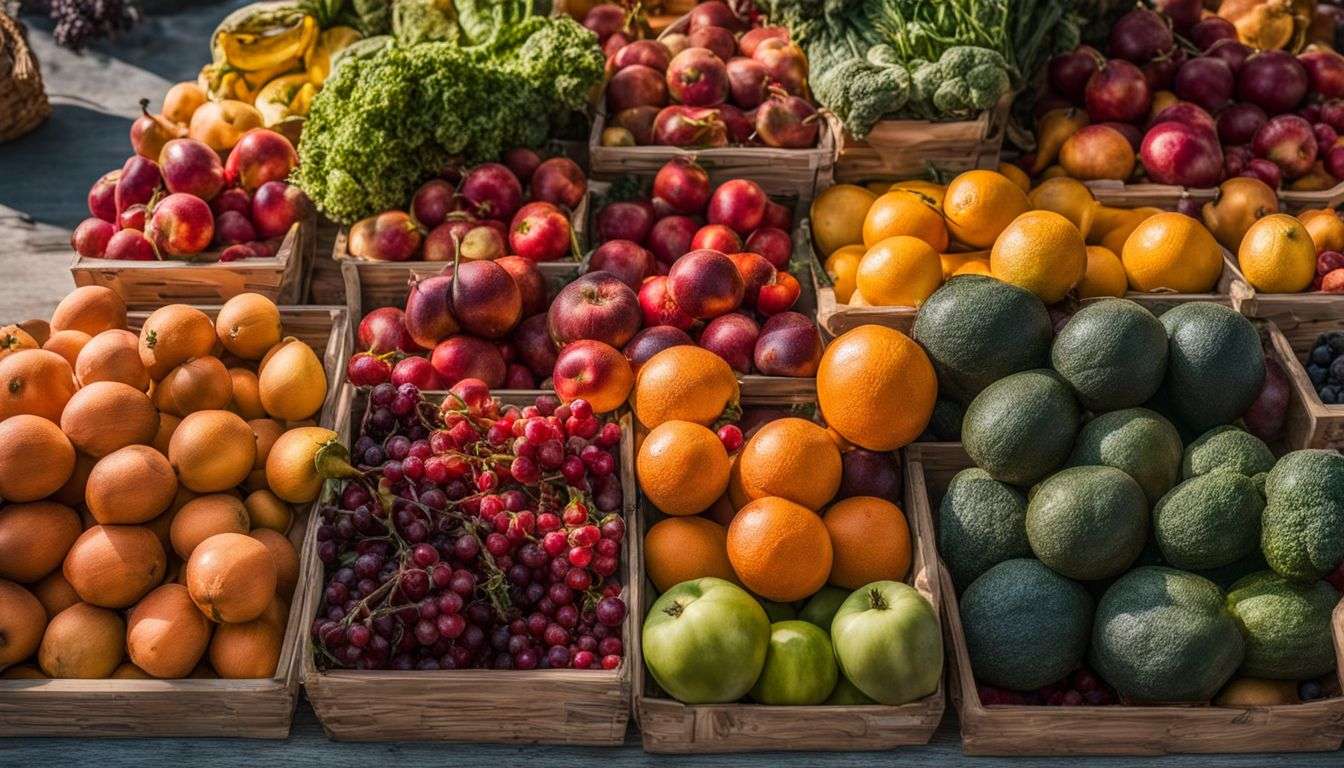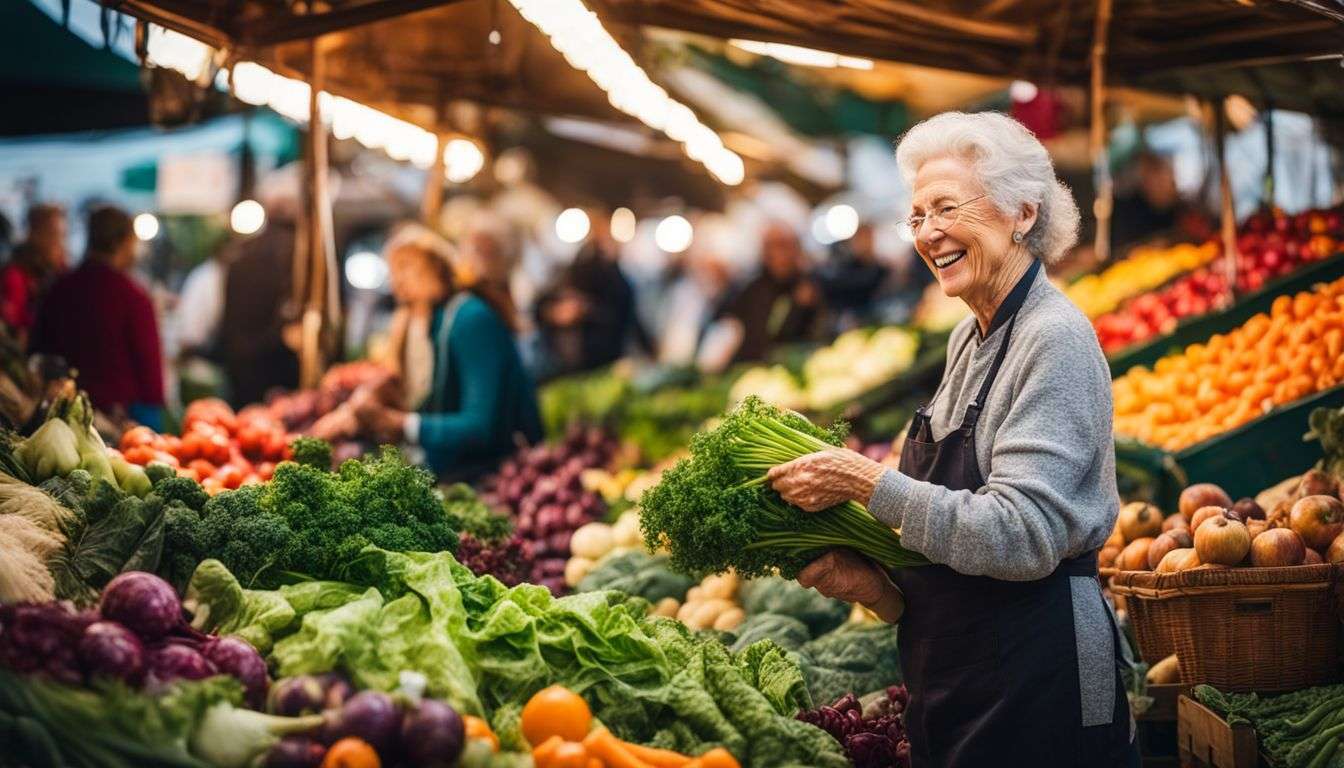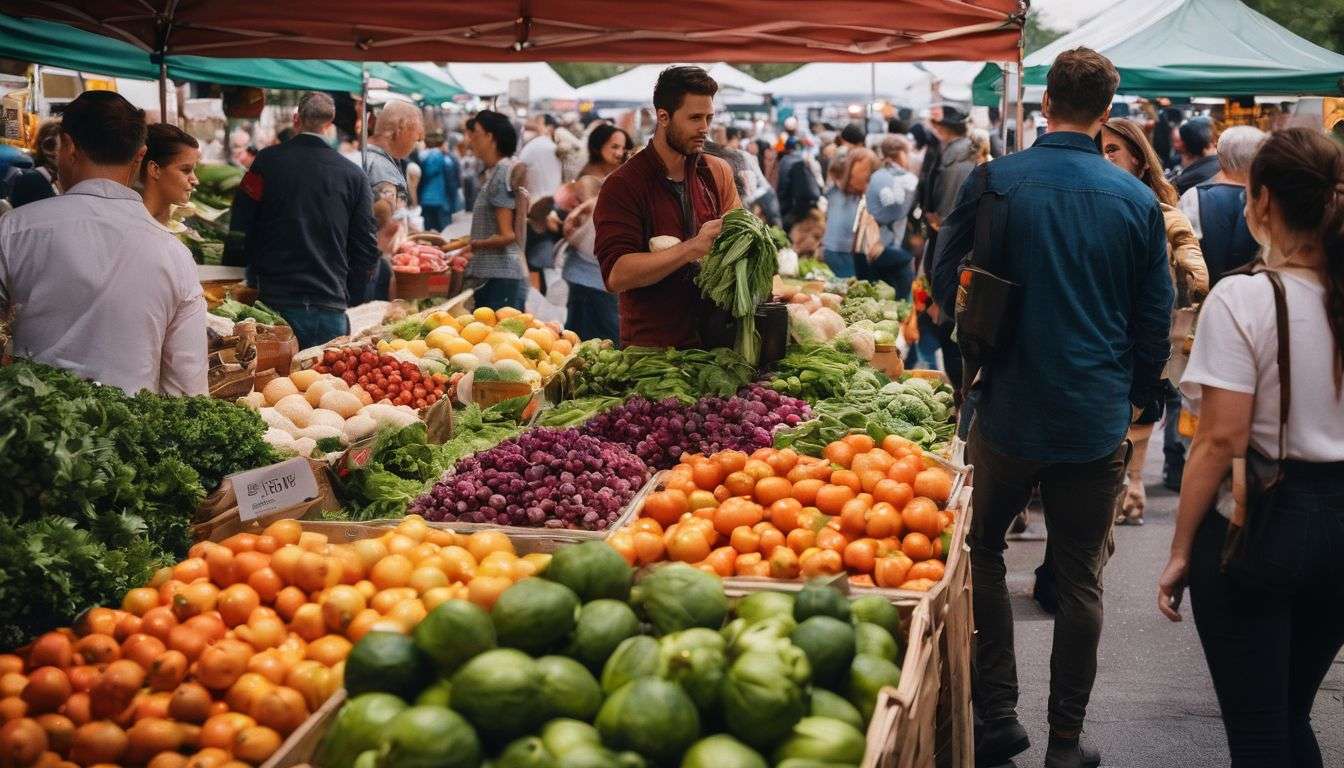Ever wonder if that organic label makes a snack better for your golden years? Organic foods buzz with claims of being healthier—packed with more nutrients and fewer nasties. Today, we’ll dig into whether those pricier, earth-friendly nibbles truly benefit our senior snacking connoisseurs.
Spoiler alert: We’re about to uncover some tasty truths!
Key Takeaways
- Organic snacks have higher levels of antioxidants and nutrients, which are great for senior health.
- Non-organic foods often contain chemical residues from pesticides, which can be harmful over time.
- Organic foods are not always free of pesticides; they just use natural ones instead.
- USDA organic seal on a snack means it meets strict standards and is mostly free from synthetic chemicals.
- While organic snacks can be healthier, they may also cost more and not all organic options are better than non-organic snacks.
Understanding Organic and Non-Organic Foods

Alright folks, let’s dive into the crunchy crux of organic and non-organic munchies. Think of it like this: on one side, you’ve got foods that are all about keeping it real with Mother Nature—the “organically grown” type that hug trees and play by the natural rulebook.
On the other side, there’s the non-organic gang—they’re cool with modern shortcuts and aren’t shy to buddy up with science in ways that might have purists raising an eyebrow or two.
So grab your magnifying glass (or reading glasses—no judgment here!) as we peel back the labels on what exactly sets these two contenders apart in the pantry showdown!
What is Organic Food?
Organic food comes from organic farming. Farmers grow these foods without synthetic stuff like chemical fertilizers or pesticides. They use natural ways to help plants grow, such as rotating crops and using composted manure.
This makes the soil healthier and helps plants resist pests naturally.
When you eat organic food, you’re getting bites full of good things like nutrients, minerals, and antioxidants. These are higher in organically grown snacks than in regular ones. Plus, no yucky chemicals! The USDA even has special rules for labels like “100 Percent Organic” to make sure what you’re eating is truly organic.
So when you pick that apple with the “USDA Organic” seal, it’s a thumbs up for being real-deal organic!
What is Non-Organic Food?
Non-organic food comes from farms that use synthetic stuff to help plants grow and keep bugs away. This means they might spray chemicals or use artificial fertilizers on crops. They also give animals antibiotics and things to make them grow faster.
These foods often have residues from these chemicals, which can be bad for our health. For example, eating non-organic food could increase your chances of getting sick with cancer because some of the pesticides used are really harmful.
On the other hand, these farms produce lots of food quickly, which helps feed more people. But this way of farming can hurt the land and air over time. Some crops even get changed in labs (we call them genetically modified organisms, or GMOs) to resist certain bugs or survive weed killers better.
Not all changes like this are bad, but some GMOs have extra toxins that aren’t naturally there. That’s why it’s good to know what you’re eating!
Nutritional Differences Between Organic and Non-Organic Foods

When we’re talkin’ grub, especially for our wise-and-seasoned pals — you know, the seniors — the organic vs. non-organic smackdown is more than just a price tag face-off. It’s about what packs the most punch nutritionally speaking! So let’s dive into this culinary conundrum and figure out if going green (the organic way) truly has an edge on those everyday eats or if it’s all just a bunch of fancy farm-to-table fluff.
Nutrient Content in Organic Foods
Organic foods pack a punch with nutrients! They’re like tiny superheroes for your cells. Think of them as extra shields against bad guys, thanks to their high antioxidant levels – sometimes up to 69% more.
Wow, that’s almost like munching on an additional salad or a couple of apples without even knowing it. You get more vitamin C, zinc, and iron in these natural goodies because they grow strong fighting off pests without chemical help.
Eating organic isn’t just about fewer chemicals; it’s also about treating yourself to more nourishment. It’s like choosing a treasure chest full of health over a plain old box. These foods work hard behind the scenes boosting your body with vitamins and minerals that keep you feeling top-notch.
Plus, let’s not forget those mighty antioxidants from organic farms helping guard your cells—it’s pretty cool stuff!
Nutrient Content in Non-Organic Foods
Non-organic foods often come from farms that use different ways to grow crops and raise animals. These methods can include using chemical pesticides and fertilizers that help plants grow bigger and faster.
But this doesn’t mean the food has more nutrients. In fact, these snacks might have fewer vitamins and good stuff like antioxidants because they were not grown with natural stuff in the dirt.
Now about those non-organic apples or crackers you might munch on? They could have tiny bits of chemicals from pesticides on them. Sure, farmers wash them, but sometimes little bits stay on the food.
And when it comes to how juicy an orange is or how sweet a strawberry tastes, things like rain, sunlight, and what kind of dirt the farm has can make a big difference too. It’s all part of what makes each snack pack its own punch!
Health Benefits of Organic Foods for Seniors

Hey there, let’s have a little heart-to-heart about something your taste buds and ticker will thank you for. When it comes to the golden years, opting for organic can be like giving your health a bear hug—it’s all about savoring those snacks that do more than just tickle your palate but also give your well-being some extra TLC.
Antioxidant Content
Organic foods pack a punch of antioxidants. In fact, they can have up to 69% more than their non-organic buddies. That’s like getting an extra serving or two of fruits and veggies every single day—without even trying! Plants raised without chemicals need to fight off bugs and weeds on their own.
So, they work harder and make more antioxidants.
Chowing down on organic snacks means seniors get these mighty little helpers in their diet. Antioxidants are big-time heroes, keeping our cells safe from damage. Imagine tiny bodyguards hustling around inside you, blocking the bad stuff that wants to cause trouble.
Now that’s some solid health defense for the golden years!
Reduced Pesticide Exposure
Eating organic snacks means less pesticides. These chemicals can be bad for our health. They use them a lot on non-organic farms to kill bugs and weeds. But when seniors munch on organic treats, they avoid these risky bits.
Studies show that organic foods have way fewer pesticide residues.
Guess what? Organic crops are 48% lower in cadmium than regular ones. Cadmium is a metal we don’t want in our bodies! So, by choosing organic, seniors help their bodies stay clean from this stuff.
Now let’s talk about how organic food may make hearts happy and healthy!
Improved Cardiovascular Health
Organic snacks might just be a heart’s best friend. These treats often have more omega-3 fatty acids, which are great for keeping hearts healthy. Studies show that organic dairy and meat are especially good because they have higher levels of these helpful fats.
Less saturated fat is another plus found in organic meats compared to regular ones.
So, munching on organic eats could help seniors keep heart disease at bay. That means enjoying things like fresh organic produce or sipping on some organic milk can be tasty ways to support a strong and happy heart.
And let’s face it, who doesn’t want their ticker to keep ticking along trouble-free?
Better Overall Health
So, keeping your heart happy is just one piece of the puzzle. A big bonus of munching on organic snacks is better health from head to toe. Why? Well, those organic apples and oatmeal cookies are packed with good stuff.
Think about it – they’ve got more antioxidants than your average snack. It’s like getting an extra fruit salad in your day without even trying! Plus, eating things that come straight from nature means less nasty chemicals in your body.
Now let’s talk numbers – because who doesn’t love a good fact? Organic foods can have up to 69% more antioxidants, which is huge! These superheroes fight off damage to your cells and keep you feeling young and spry.
And get this: going for the organic choice can mean saying goodbye to harmful pesticides that could make you sick over time. So not only are you getting a tasty treat, but you’re also giving yourself some top-notch fuel that keeps everything running smoothly—like a well-oiled machine!
Misconceptions About Organic Foods

While you might believe switching to all things labeled organic is a one-way ticket to health town, hold onto your hats, folks – there’s more to this story than meets the eye.. (And trust me, you’re gonna want to stick around for these juicy tidbits!).
Organic Foods Are Always Healthier
People often think organic snacks are the best choice for health. They see the USDA organic seal and believe they’re eating something good for them. But hold on—not all organic foods are superfoods! Sure, organics avoid synthetic pesticides and fertilizers, but that doesn’t make every organic snack a star player in your healthy diet.
Some organics still pack plenty of sugar or salt, not so different from their non-organic buddies. And just because it’s “certified organic” doesn’t mean it’s 100% free of pesticides; natural ones are used instead.
We’ve got to look closely at what we eat, whether it sports an organic label or not!
Organic Foods Are Pesticide-Free
Organic foods have a big plus—they’re made without the yucky stuff like artificial chemicals. That’s right, no man-made pesticides! Farmers who grow organic crops use natural ways to keep bugs and weeds away.
They might set bugs that eat pests free in their fields or plant different things side by side to confuse the pests. And another thing, they don’t just care about the plants; they also want to protect the soil and water around them.
So when you choose organic snacks, you’re biting into food that’s clean from stuff that could harm your body. The United States Department of Agriculture (USDA) is pretty strict with its rules for what gets called “organic.” These tasty treats meet high standards before earning the USDA organic certification sticker—a little green label that gives you peace of mind knowing your snack is pesticide-free!
How to Identify Organic Foods
You’re at the store and you want to buy organic snacks for good health, right? Well, spotting these foods is easier than you might think. Here’s how to do it:
- Look out for the USDA organic seal. This little green and white label means the food meets strict rules.
- Check the label for “100% Organic” or “Organic”. If it says “100% Organic”, everything in it is organic. Just “Organic” means at least 95% of it is.
- Be a detective with ingredient lists. Words like “genetically engineered” or “artificial” are no-nos in organics.
- Scan for code numbers on fresh produce. Starts with a 9? It’s organic!
- Got a favorite brand? See if they have an organic version. Many brands offer both types now.
- Visit your local farmers’ market where you can chat with the farmers and ask about their methods.
- Keep an eye out for shops and co-ops that focus on natural foods – they often have lots of organic choices.
Pros and Cons of Organic Vs Non-Organic Foods
Okay, let’s dive right into the thick of it—organic versus non-organic. It’s like the heavyweight bout of the snack world, especially for seniors who’ve got to keep an eagle eye on their health. So here’s the lowdown:
| Pros of Organic Foods | Cons of Organic Foods |
|---|---|
| Organic snacks shun synthetic pesticides, making ’em a safer bet for seniors who’ve seen enough chemicals in their time, don’t you think? | Sure, organic is awesome, but it hits the wallet harder. That organic certification? Not cheap, my friends. |
| Chowing down on organic means feasting on a more favorable fatty acid profile—hello, omega-3s in dairy! | Organic doesn’t automatically equal healthy. Organic cookies are still cookies, folks. Just saying. |
| Want a boost in antioxidants, vitamins, and minerals? Research nods towards organic crops. Seniors, take note! | Availability can be a snag. Sometimes finding those organic goodies feels like a scavenger hunt without the fun. |
| Limited exposure to those pesky pesticides? Yep, it’s a win when you go organic. | And then there’s the shelf life—organic snacks might throw in the towel sooner, which means more frequent shopping trips. |
Alright, that’s the scoop! Remember, going organic is a choice, and it’s all about balance. Keep it real and stay savvy with your snacks, seniors!
Conclusion
In the snack battle between organic and non-organic, it seems seniors have a lot to think about. Going organic could mean more antioxidants and fewer bad chemicals. But let’s not forget that healthy eating is bigger than just one choice.
So, whether you’re munching on an organic apple or a regular granola bar, the real win is in aiming for those nutritious bites! And hey, don’t stress too much – enjoying your food matters too!
FAQs
1. Why should seniors care about eating organic snacks?
Well, let me tell you – organic snacks are like the superheroes of food for seniors! They’re packed with nutritional value and micronutrients, which are just what a body needs to keep feeling awesome as it ages.
2. Are non-organic snacks really bad for older folks?
Hmm, “bad” might be strong but think about it – they often have stuff like artificial sweeteners and GMOs that don’t sit well with human health. Plus, all those added chemicals? Not exactly what nature intended!
3. What makes organic farming practices better anyway?
Organic farmers are like Earth’s buddies; they use cool things like crop rotation and natural fertilizers (think dung – eww!) to keep the soil super healthy without any of those genetically engineered crops mixing in.
4. Gotcha! So can eating organic reduce health risks for seniors?
You bet! Studies show munching on organically grown foods lowers cancer risk compared to chowing down on their non-organic pals. Also… no toxic metals from pesticides making unwelcome appearances here!
5. Do “organic” eggs taste different than regular ones?
Some people swear they do; others say nope, an egg is an egg! But here’s the fun fact: hens pecking around in the great outdoors may give you eggs loaded with more good stuff like Vitamin E.
6. Is going fully organic going to burn a hole in my wallet?
It might feel that way at first glance… but check out places like farmers’ markets or join a community-supported agriculture (CSA) group – your pocketbook will thank you -and hey- Mother Earth gives you a high-five too!





